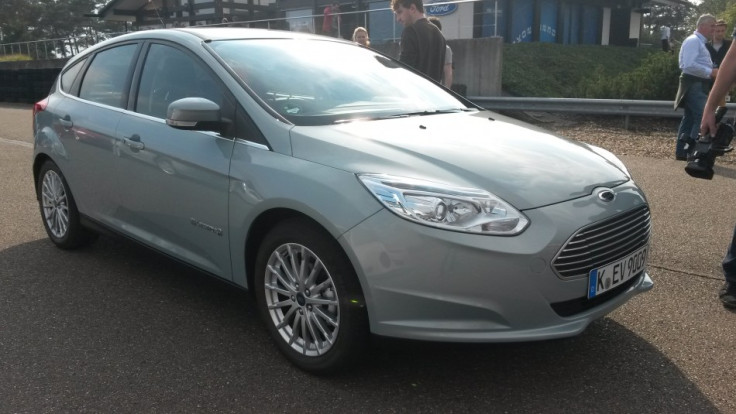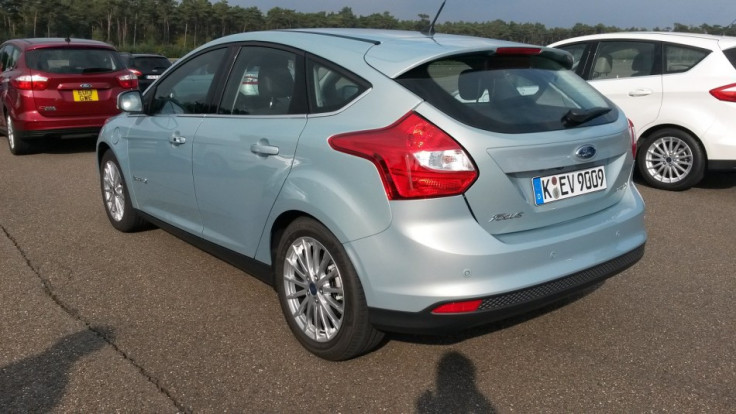Ford Focus Electric: First Drive
Alistair Charlton visits the Ford proving ground in Lommel, Belgium to drive the upcoming Focus Electric, the American manufacturer's first attempt at bringing electric power to the masses.

Until now, electric and hybrid cars like the Nissan Leaf and Toyota Prius have tried to offer environmentally-friendly motoring as something entirely new, detached from their petrol and diesel relatives - but now Ford is on a different route, taking the Focus hatchback we all know and love, and adding electric power without trying to give the car a new identity.
First of all, driving any electric car is a strange experience. A press of the Start/Stop button does little more than light up the dashboard, and without the noise and vibrations of an engine, or a rev counter flickering into life (or a rev counter at all, for that matter), cars like this Ford Focus Electric feel unsettling at first.
But press the foot brake and shift the car into Drive as you would with any other automatic, and the Focus Electric is ready to go. And go it does. Thanks to electric motors' ability to offer their maximum power and torque from standstill - unlike a combustion engine, which gradually gains power as it progresses through the rev range - the car offers surprising acceleration off the line.
Weight
Put your foot down and, after a brief pause, there is a satisfying surge as the motor shoves you forward with surprising strength (143bhp and 181lb ft of torque, to be precise), especially considering the car's extra weight - the two packs of lithium ion batteries together weigh 300kg, and nothing is saved in swapping petrol engine for electric motor.
Carrying the equivalent of three large passengers will hamper any car's performance, and although bespoke electric car manufacturers like Tesla can install the batteries incredibly low down, lowering the car's centre of gravity and thus increasing stability, cars which have been adapted for electric power miss out.
The Focus Electric has one battery pack below the rear seats and one in the boot - the latter reducing load space from 319 litres to 190 - and despite the decent acceleration, that extra 300kg makes itself known in the corners.
To counteract this pendulum effect at the rear, Ford has stiffened up the suspension, which goes some way towards keeping the back in check - especially over the cambered crests of Ford's Lommel proving ground - but this makes for a harsh ride on anything but the smoothest of road.

Eerily quiet
Once past about 30mph, the electric motor's surge fades to what you'd expect from a conventional small- to medium-sized car like the Focus, but by now the electric motor's humming and lack of any other noise is what takes over your senses. The faint, sci-fi-like whine is joined by road and wind noise as speed builds, but the lack of engine noise is slightly uncomfortable at first, like a pilot easing off the throttle of an aeroplane and for a moment everything goes eerily quiet. It also makes you think you're going slower than you really are.
Ford claims a 0-60 miles per hour time of 11 seconds, which won't set the world on fire, but then this is hardly meant to be a performance vehicle - and a heavy right foot will see the claimed 100 mile range start to tumble.
During my drive of the Focus, I noticed at one point the indicated range fell five kilometers in just a couple of minutes, and over a distance of probably no more than 2km.
Recharging from empty through a conventional household plug takes a hefty 10 hours - fine if you can recharge at home and work, but a severely limiting factor common across the electric car market when it comes to planning journeys longer than 100 miles.
Energy harvesting
To help you reach that claimed range, the Focus Electric can harvest energy from the brakes - known as regenerative braking - but this has the side effect of making the brakes feel overly sharp - something a buyer would no doubt get used to, but at first the jerky action makes you feel like the car should be displaying some red L plates.
Inside, the Focus Electric is identical to the regular model, save for a 4.2in screen next to the speedometer indicating remaining charge, range and if any electricity harvesting is taking place - the BrakeCoach app helps explain how best to replenish the battery through braking. The electric model comes with Ford's top-end Titanium trim level as standard - including an upgraded digital radio and part-leather seats - but no matter how many gadgets and luxuries Ford cram in, I'm struggling to be anything less than shocked at the £33,500 price.
Expectation of quality
Factor in the government's £5,000 electric car grant and you're still looking at a car that's £8,000 more than the upcoming BMW i3 (after it too gets a £5,000 discount).
The BMW may be smaller than the Focus and its design could certainly be described as 'challenging', but the BMW badge still brings with it an expectation of quality and refinement that Ford struggles to match - and being an electric car from birth, the i3 is significantly lighter and quicker than the Focus, while offering the same range.
Ford could have made this car the tipping point for the industry, bringing electric power to the masses in a friendly and familiar package that doesn't seek to stand out quite as boldly as the BMW i3 or Nissan Leaf, but at £28,500 it's almost £10,000 more than a regular petrol Focus Titanium, and that's simply too much.
The Ford Focus Electric is on sale now with deliveries starting in early 2014.
© Copyright IBTimes 2025. All rights reserved.






















